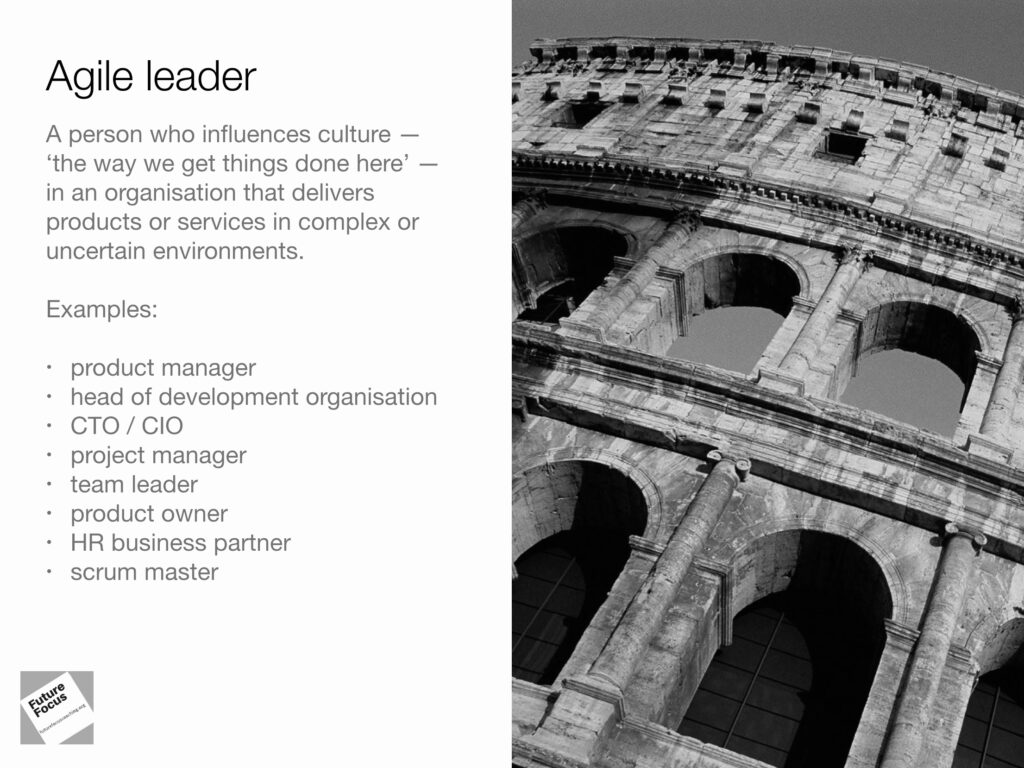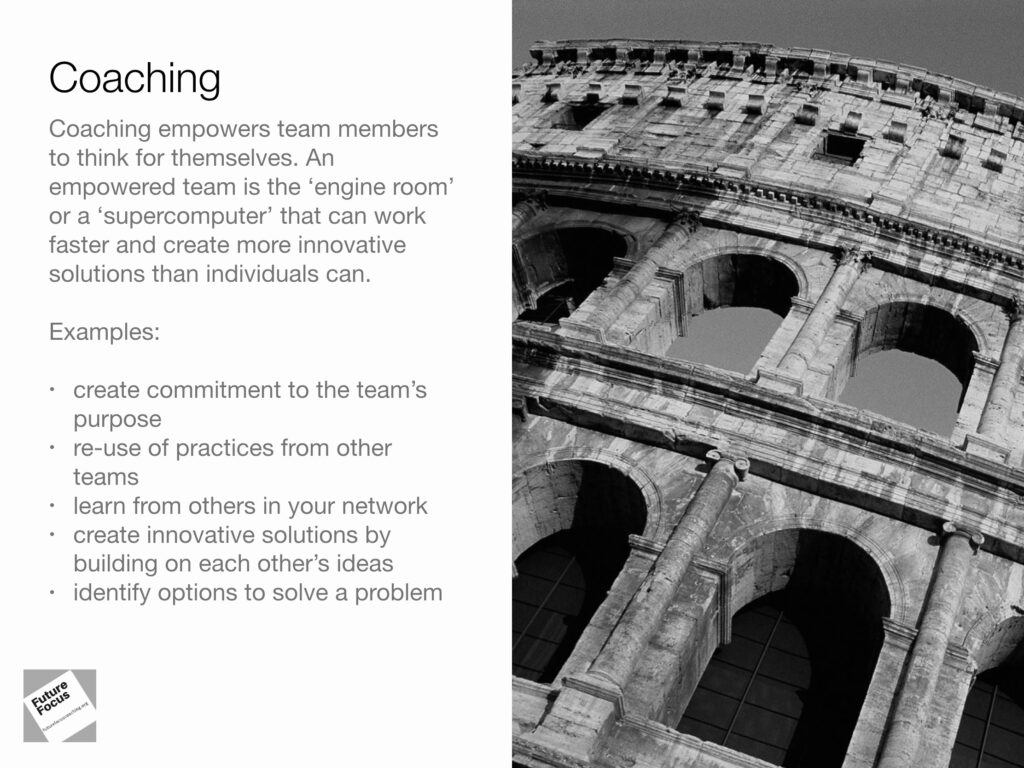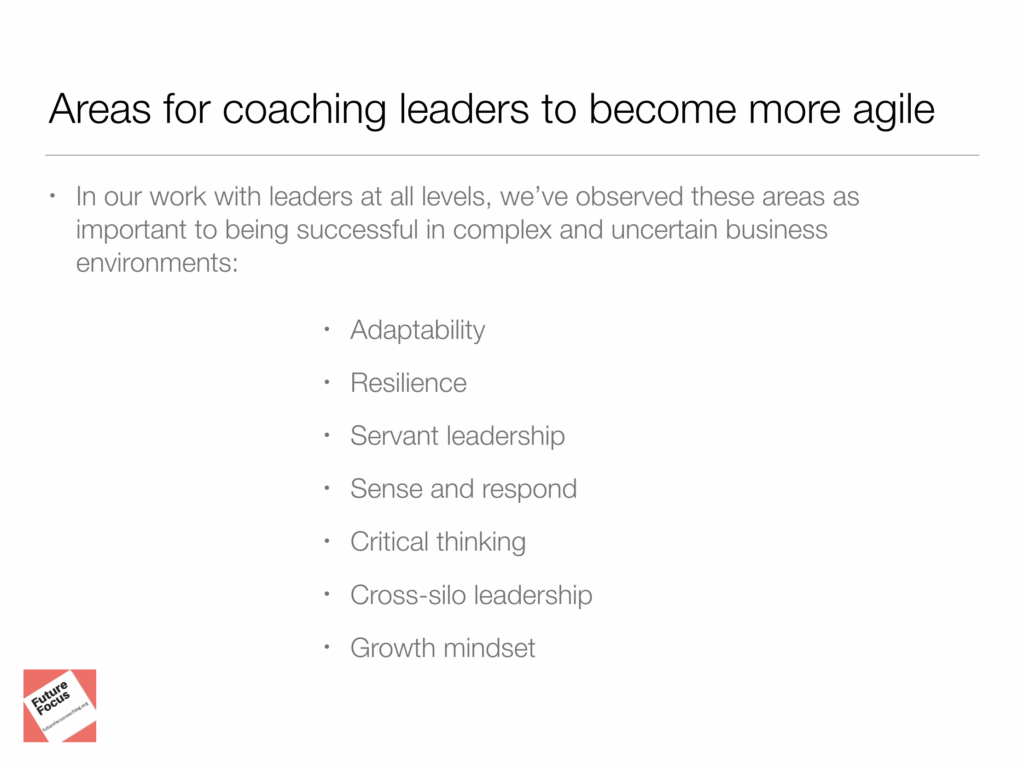Answers to your questions from the webinar, my notes, and of course the webinar recording here.
Agile Coaching isn’t just for teams! Leaders have just as much, if not more, influence on creating a culture to beat the competition and stay relevant in today’s fast-paced market.
Agile Leadership coaching helps you build resilience, think strategically, motivate your teams, and plan for the future.


This webinar is for leaders of development organisations, directors, product managers, senior project and programme managers, and HR business partners.

Notes
I promised to send my notes on each the areas that come up for leaders that work in complex and uncertain environments — leaders who want to be agile. Here are descriptions of each of the areas for leadership coaching that I mentioned.
Adaptability
Being able to adjust to new conditions
Resilience
The capacity to remain flexible in thoughts, behaviours and emotions when under stress. For more on resilience coaching, have a look at the work of Carole Pemberton.
Servant leadership
A leadership philosophy and set of practices, defined by Robert Greenleaf, to build better organisations. A servant leader ensures that other people’s highest-priority needs are being served. He said the test of servant leadership is Do those served grow as people? Do they become healthier, wiser, freer, more autonomous? I discuss servant leadership in my book Becoming Agile.
Sense and respond
Sense – acute and accurate awareness of what’s going on in the world and in business, in broad terms. Awareness of the facts. Respond – to make a small adjustment in how we lead or work with others, to move closer to what we want. Working incrementally toward goals or objectives.
Critical thinking
Solving problems through rational processes and evidence-based knowledge.
Cross-silo leadership
Leading with the whole organisation in mind. Helping teams see their work though the eyes of customers, business partners, or suppliers. Read my book Becoming Agile for more about what this means for individual leaders and their teams.
Growth mindset
The belief that we were not born with all of the skills needed for life and work. We can learn and improve through our own effort. For more on this, see the work of Carol Dweck.
Q&A
How do you explain the Agile concept when you coach and in what session do you introduce it to the coachee?
I try to hold back from explaining or ‘telling’ in my work, as much as possible. Some of agile coaching is teaching agile frameworks and techniques, so I only explain concepts if appropriate. As a leadership coach, my first job is to find out what the client wants from the coaching session and work from that point.
How is ‘adaptability’ different from ‘sense and respond’?
Thanks for that great question. The phrase ‘sense and respond’ has to do with taking in a wide plane of information about current events and global trends in business and other arenas (political, economic, social, technological, legal, and environmental). By understanding systemic trends (sense), a leader can then work toward incremental change (respond).
To me, adaptability is a personal willingness to have the courage to throw away the plan when needed, and change to current conditions.
When you are coaching, how do you practice selflessness and how to understand it’s the moment your ego forces you to make the decision and how do you come to the state of ego-free coaching?
I mentioned that a great deal of information about your client and the coaching relationship comes from paying attention to your (coach’s) own feelings, instincts, thoughts, responses. Nevertheless, when coaching we always work with the client’s agenda, not ours.
What tips do you have for coaches on coaching leaders who don’t appear to have a growth mindset? Leaders who are stuck in their ways and are not seeing the reasons to change?
My question back to you is ‘how do you know’? It may seem at first as if someone doesn’t have a growth mindset, however I think what we’re noticing is a resistance to change. That can have many root causes. Tell your client what you’re noticing, and ask for their thoughts. Try giving feedback and asking a question to draw out their thoughts and feelings.
Some people really don’t have a growth mindset, and if your client determines that that’s the case or you’ve seen/heard evidence that convinces you of that, work with your client to understand the strength of their need to learn new skills. I’d ask the client to rate their need on a scale (say 1-5), and go from there.

